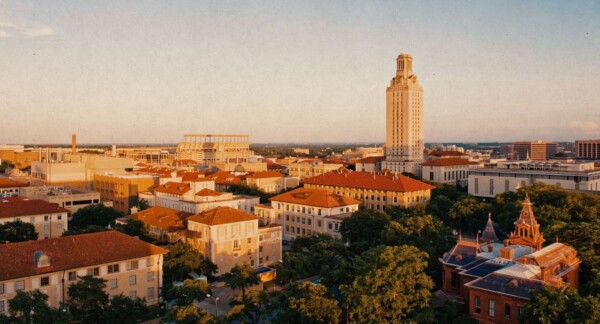Birth of a Technopolis
Entrepreneurship initiatives begun 40 years ago created a launchpad for global leadership
By Bradley Keoun

Houstonian Scott Tynes came to Austin to get an MBA, and he never left. Tynes, MBA ’99, worked first at IBM’s edgy Tivoli enterprise management software division before taking a job at Trilogy, the geek-proud software startup formed by Stanford drop-out Joe Liemandt.
In 2006, Tynes followed his own entrepreneurial yearnings to form Consero with fellow McCombs classmate Bill Klein, MBA ’99. A decade later, Consero has 300 employees and last year scored $5 million from Kayne Anderson Capital Advisors, a $20 billion investment firm in Los Angeles.
There’s a pattern here, long recognized by McCombs faculty members who are acutely aware of the interaction among the university, the innovation and technology region in which it operates, and the entrepreneurial successes of business alumni.
In his 2016 State of the Union address, former President Barack Obama spoke of U.S. entrepreneurs “from Boston to Austin to Silicon Valley racing to shape a better world.” Unspoken was the role UT Austin has played in educating risk-takers and visionaries in all of these markets and beyond.
“Four decades ago, the Austin economy was the university and state government,” reminds Professor John Sibley Butler, founding director of the Herb Kelleher Center for Entrepreneurship at McCombs and former director of the IC² Institute. “George Kozmetsky, who formed the IC² Institute during his 16 years as dean of the school of business, had the clearest vision of anyone about the capacity of this region. He became our technology ambassador to the world.”
Kozmetsky, who mentored tech entrepreneurs including Michael Dell (Dell Inc.) and Jim Truchard (National Instruments), and co-founded Teledyne, co-wrote the book Creating the Technopolis: Linking Technology Commercialization and Economic Development, a researched look at how entrepreneurial regions are created.

Dissecting the Startup Life Cycle
Turns out that Tynes’ journey is emblematic of the factors that drive entrepreneurial ecosystems. A study by Butler and research partners Professor Rajiv Garg and research fellow Bryan Stephens explains how economic regions from Austin to Silicon Valley attract and keep tech founders in their orbits.
Their paper “Social Networks and Regional Advantages in Technology Entrepreneurship” is one of the first studies to integrate personal-level and metro-level data to expand upon Kozmetsky’s seminal studies on the technopolis.
Sifting through regional economic data as well as personal information drawn from sources such as tech entrepreneurs’ LinkedIn profiles, they identify three interrelated factors that combine to draw new entrepreneurs to a region and encourage them to stay and launch additional ventures:
Presence of large technology firms
Established technology firms attract tech-skilled employees (such as Tynes) to the region, who are then more likely to start or join entrepreneurial ventures.
Social network support
Personal factors, such as a strong network of professional colleagues, influence where entrepreneurs settle and serve to keep them in the same city as they launch new companies.
Number of new funding rounds
The number of new funding rounds in a region has a greater influence on drawing new entrepreneurs than the total amount of available funding. One hypothesis is that smaller regions appear to offer more early-round funding opportunities for new ventures.
Advice, Coaching, and a Place to Sit
Daniel Nelson, MBA ’06, needed an idea for a class project in 2006, so he borrowed a programming project from friend Robert Reeves, Economics ’02. He pitched the business plan in the school’s Texas Moot Corp Competition (now Texas Venture Labs Investment Competition) and won.
Scrambling to turn the class idea into a working business, Nelson and Reeves took up residency in the Austin Technology Incubator, founded by IC², where they got seasoned advice from Rob Adams, a former investor and Lotus executive, who now directs the Jon Brumley Texas Venture Labs. They moved into an office at ATI, and four years later their company Phurnace was acquired by BMC Software for “a nice exit,” according to Reeves.
Reeves was so impressed, he enrolled in the Master of Science in Technology Commercialization program at McCombs, a one-year immersion in tech entrepreneurship. While there, Reeves, MSTC ’12, launched another company, Datical, which now counts Bank of America, eBay, and Fidelity as customers.
Launchpad for Global Entrepreneurship
The University of Texas at Austin performs on a big startup stage dominated by innovation giants such as Stanford. And Austin’s emergence over the last decade as a hot entrepreneurial region has been a steroid boost for the university’s reputation and the credibility of its graduates. Butler’s research ranks Austin as second only to the Bay Area among top U.S. locations for launching tech startups.
“When you brush off the Silicon Valley patina, McCombs is going to give you far more successful outings. We’re starting viable businesses that have legs, and that’s why we get so many acquisitions.” —Robert Reeves
West Coast-based McCombs alums acknowledge Austin’s growing stature. Shane Brisbin, MBA ’94, a Morgan Stanley private wealth adviser, has personally invested in Datical and Austin-based Xeris Pharmaceuticals, a developer of new diabetes-drug formulas for pen injectors. He participated in a $41 million investment round for Xeris announced in January.
“People want to live there [Austin], and the more innovation you have, the more people will want to live there.” —Shane Brisbin
Isaac Barchas, a former McKinsey consultant who now heads ATI, says the push into entrepreneurship by McCombs helped stem the tide of business and engineering graduates heading to Massachusetts and California in search of jobs and capital.
While Austin lacks the big venture capital firms of Silicon Valley’s famed Sand Hill Road, there are plenty of Austin investors looking to put money into promising startups. Central Texas Angel Network, a pool of individual investors who back small but fast-growing companies, was the third most active investor of its kind in the U.S. in 2015, according to the Halo Report. The network was started in 2006 by Jamie Rhodes, MSTC ’02, a former IBM executive and co-founder of Austin-based National NanoMaterials.
“That’s something that may not have been in place had we not been in the MSTC program and learned what startups were all about,” says Lance Adams, MSTC ’02, a real estate executive and one of Rhodes’ classmates.
Bryan Stolle, MBA ’87, founded San Jose, California-based Agile Software Corp. and took it public before selling the company to Oracle in 2007 for $495 million. He says UT is doing for Austin what Stanford did for the Bay Area. Stolle is now a partner at venture-capital firm Mohr Davidow, working out of Menlo Park, California, and San Francisco. Stolle led the firm to invest in at least three Austin companies: Datical; OneSpot, a digital marketing company whose customers include Intel, Johnson & Johnson, and Whole Foods; and People Pattern, developer of a software platform that combs data from tweets and posts to identify potential customers. People Pattern was co-founded by Ken Cho, MBA ‘03.
“It’s been a pretty remarkable transformation,” Stolle says of Austin. “Now you’re getting a critical mass in the primordial soup.”
Professor Garg points out that the university fits perfectly into the startup formula he and his colleagues identified in their study. “It begins with a strong presence of technology employment in the region, an active funding environment — a large number of funding rounds and not necessarily the funding amount — and finally a strong professional network.”
Decades ago, Kozmetsky and others recognized the university’s potential for nurturing just such an environment. The big winners today are faculty members, students, investors, and the worldwide economic regions where graduates go to pursue their dreams.
Initiatives, Ventures, and Entrepreneurial Enterprises from McCombs
Herb Kelleher Center for Entrepreneurship, Growth, and Renewal
Started in 2001 with a donation from the founder of Southwest Airlines, the McCombs-housed center spurs entrepreneurship through teaching, one-on-one mentorship, and academic research. Center faculty help teach the university’s 28 entrepreneurship courses and conduct research on innovation and creativity. Sponsored speakers share their insights with students on launching, funding, and sustaining a new business.
Master of Science in Technology Commercialization
This one-year immersion in technology entrepreneurship is nearing two decades of operation, and it remains one of the most popular programs for science- and technology- focused professionals who want to take innovations to market.The coursework combines cutting-edge technology, hands-on entrepreneurship, and a proprietary approach for reaching “go-no-go” decisions in the startup phase. MSTC startup successes include Alafair Biosciences, Beyonic, and Seismos.
Jon Brumley Texas Venture Labs
Director Rob Adams and UT Austin graduate students run this business accelerator that helps companies move from the market research phase to startup, through consulting, analysis, and investor introductions. JBTVL also offers entrepreneurship courses and sponsors the Texas Venture Labs Investment Competition as a practicum for learning the art of venture capital pitches. Harlan Beverly, MBA ’04, founder of Bigfoot Networks, joined as assistant director in 2015 and has introduced a new course for undergraduates about lean startup essentials. JBTVL and the MBA program provide scholarships of up to $174,000 combined value to attract entrepreneurial MBA students.
Venture Fellows
The Venture Fellows program was started in 1999 to give MBA students real world experience. Participants are assigned to work with local venture capital and private equity firms. Recent fellows include Matteo Pacifici, MBA ’16, who worked for Spindletop Capital, an Austin-based venture capital firm focused on health care; Emily Ashby, MBA ’15, who interned for Owner Resource Group, an Austin investment firm that focuses on companies with at least $15 million of revenue; and Chris Barjum, MBA ’16, who worked at Sentient Ventures.
IC² Institute
The IC² Institute was founded in 1977 as a “think and do” tank to test the belief of its founder, George Kozmetsky, that technological innovation can drive regional economic development through university, government, and private sector collaboration.
Since its inception, IC2 has had strong ties to the school of business through the active engagement of faculty members, who have served in leadership and research positions, including former director John S. Butler, advisory board member William Cunningham, and current director Robert Peterson. The institute provides academic resources in support of technology innovation, nurtures global commercialization opportunities, and delivers economic and policy insights to government and private decision-makers.
Austin Technology Incubator
Started in 1989, ATI offers shared office space where budding entrepreneurs can work without signing multi-year leases. Companies must compete to enter the program, and once accepted, they get UT faculty and proven executives as mentors, as well as introductions to investors. Among the companies to participate, BlackLocus, a Pittsburgh startup, was lured to Austin by ATI in 2011. The following year, it was acquired by Home Depot and still operates in Austin as an innovation lab for the home improvement chain.
From the spring 2016 issue of McCombs, the magazine for alumni and friends of the McCombs School of Business.
http://www.today.mccombs.utexas.edu/2016/05/birth-of-a-technopolis-entrepreneurship-and-leadership
